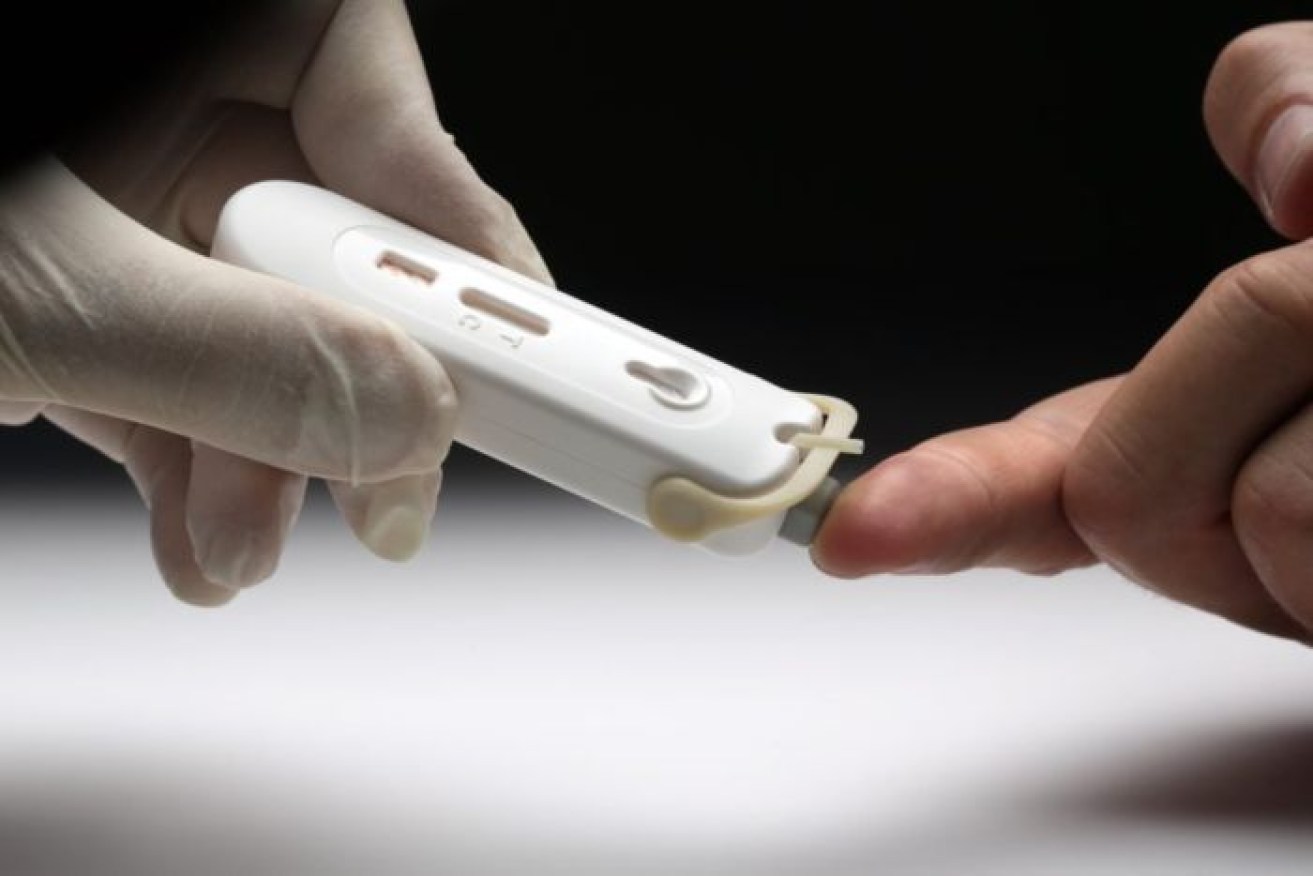At-home test the ‘missing piece’ in fight against HIV and AIDS

Self-testing could mean people afraid to ask for an HIV test can do so in the comfort of their own home. Photo:Twitter, Atomo Diagnostics
The Therapeutic Goods Administration has approved for sale a HIV self-testing device described by public health advocates as “the missing puzzle piece” in the fight against the blood-borne virus.
The TGA decision means it is now possible to test for HIV at home, without having to visit a general practitioner or a sexual health clinic.
Manufactured by Sydney-based company Atomo Diagnostics, the single-use finger-prick test returns a result for HIV in 15 minutes.
Federal Health Minister Greg Hunt made the announcement at a World AIDS Day Breakfast at Parliament House in Canberra on Thursday morning.

Federal Health Minister Greg Hunt. Photo: AAP
“For those that may have a reluctance or a reason why they may not want to go to the doctor and to seek a check, it gives them that additional freedom as well as accessibility and convenience,” Mr Hunt told the ABC.
HIV self-testing devices were banned in Australia until 2014, but have since been available for purchase online from overseas retailers.
The approved Atomo device will also be available for purchase online.
Getting more people on treatment sooner
Australian Federation of AIDS Organisations chief executive officer Darryl O’Donnell said today’s announcement will make testing easier for people considered at high-risk of acquiring HIV, like gay and bisexual men.
“For those who need to test very regularly, up to four times a year, we need something that’s more convenient and more accessible for them,” he said.
“Self-testing is the missing part of the puzzle.”
LGBTI advocate Dean Beck, who has been living with the virus for five years, said while he welcomed the announcement, he said Australia still trailed behind other countries where the devices had long been available.
Self-testing is already used across much of Europe and in the US, while the World Health Organisation has recommended use of the at-home kits since 2016.
“It doesn’t excuse us being a decade behind the rest of the world in enabling people to get tested quickly and efficiently,” Mr Beck said.
He said there were sure to be cases of people having acquired HIV from an undiagnosed person who would have known their status had self-testing been available to them.
Mr Beck also hoped the tests would eventually be available over the counter in pharmacies.
Burnet Institute public health head Professor Mark Stoové said getting people on treatment as soon as possible was a key pillar of Australia’s HIV prevention strategy, and something self-testing would support.
People who are on treatment for HIV can have their viral load supressed to the point where they are incapable of passing on the virus to others.
But 10 per cent of Australians with HIV are unaware of their positive status.
Professor Stoové listed immigrants and people living in rural and remote areas as other groups in the community who stand to benefit most from self-testing, saying stigma attached to HIV often discouraged these communities from seeing a clinician.
But he said making the test more accessible meant health services “relinquished a degree of control” over the care provided to someone living with HIV.
He said it was important people who received a positive result for HIV at home then attended a medical service in-person to undergo more testing and access medication.
But while a positive result will impact them significantly, they also need to know people who are diagnosed with HIV in 2018 are now expected to live lives as long and healthy as other Australians.”
A TGA spokesperson said Atomo Diagnostics would offer a 24-hour helpline to offer assistance to the test’s users.
The Burnet Institute is working on a trial of distributing self-tests from peer-to-peer and an online platform to put people who use self-tests in contact with health providers.
Mr Hunt also announced today HIV medication Juluca had been listed on the Pharmaceutical Benefits Scheme, slashing the cost of the treatment from $11,000 annually to $39.50 per script.
Concession card holders will be able to access the drug for just $6.90 per script.
The Government has also agreed to put $5 million towards the development of a new national blood-borne virus strategy, which includes the goal of virtually eradicating HIV in Australia by 2022.
-ABC








